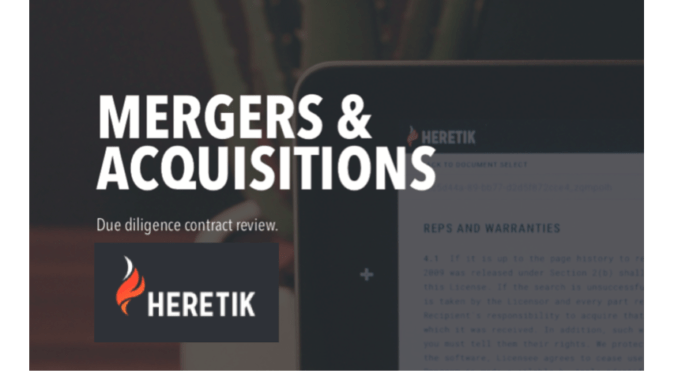
A new legal AI-driven contract review company, Heretik, which operates primarily through the well-known Relativity ediscovery platform, could well be the shape of things to come.
But, hold on a minute, I hear you say. Relativity is just for litigation review work, not for transactional or compliance work that the main legal AI pioneers are focused on, right? Not so.
First, Relativity is very much hoping to be more than just a platform for litigators and second, companies such as Chicago-based Heretik are showing that you can run a machine learning doc review system for transactional or compliance lawyers through Relativity just as easily as you can for other practice needs.
At the end of the day it’s all about legal data – collecting it together, managing it, sorting, processing, extracting it, showing and sharing the results and then making sense of it all. And Relativity is a platform that provides all this ‘plumbing’ to allow others to then do all of this and to bring their own NLP and machine learning to the party.
But, how does this work? Artificial Lawyer caught up with Charlie Connor, CEO of Heretik in Chicago a while ago to find out some more.
Connor explains that he and his fellow co-founders (David Barnes and Andy Abbott) had been working in the world of data review and analytics for some time. Connor and Barnes had also both worked at K-Cura in the past, before it rebranded as Relativity. They liked the workflow capabilities of Relativity, but could see that when it came to more granular, clause-based analysis in contracts, such as one would see in something like a Kira Systems or a Luminance AI system during a due diligence review, then there just wasn’t the same capability.
‘We wanted to take Relativity and do due diligence review, rather than create a whole new system,’ he explained.
Connor explains that by using Relatvity’s well-developed workflow platform it’s easier to organise the documents for review and then assign lawyers to look at certain doc groups that their machine learning system may have isolated during a review process.
Features the system is offering include:
- Heretik structures your data by classifying all contracts and sections by type.
- It can filter, batch, or compare sections of a document across the entire corpus of contracts.
- Group amendments to original contracts & review them in one unified experience.
- Visualize all differences among versions of the same contract or among a given section across all contracts.
- Understand what’s in the legal data with dashboards and widgets to display tables & various chart types.
- Connect to data repositories like OneDrive or Intralinks to feed it contracts for analysis.
Is Heretik’s NLP as granular and as well-developed in terms of provisions as some of its more established legal AI rivals in the market? Perhaps not, (though there has been no public ‘bakeoff’ vs other legal AI companies to get a definitive answer).
But that doesn’t bother Connor. From his perspective a key opportunity will be to work with law firms that are already working with Relativity, most likely for litigation matters, and can then stretch its use into transactional and other types of doc review using their system.
Does this mean that the end result may need a bit more human input than some of the other AI systems out there which seek to absorb as much of the human labour as possible into the automated process (at least once the training is completed)? Perhaps.
Again, Connor doesn’t seem worried by this.
‘We call this workflow powered by machine learning,’ he says. ‘We look at where we can give value and make legal data meaningful.’
And, perhaps he is right, at least for some firms. Not all law firms want to automate as much as possible. Some firms, rather as they do still with ediscovery, feel quite happy automating part of the doc review process, but leaving plenty behind for lawyers to do.
One client that is already signed up and listed on the website is US law firm, Reed Smith, which is apparently very happy with the results.
Will other law firms be attracted to the ability to leverage a slick platform like Relativity with all of its workflow benefits from one practice area to another, i.e starting with litigation and then spreading it out into areas such as corporate review for M&A? Could be. There is a clear logic there, for certain.
Moreover, while Heretik is just getting started on its machine learning, it will in time – as have all the other legal AI companies – see its NLP and granular analysis capabilities improve. Competitors in the space such as Kira or Seal Software may have a head start in terms of machine learning time, but, Heretik has the globally popular Relativity platform on its side.
In which case, there is everything to play for here. This move also raises the increasingly clear importance of platforms and poses the question of if we are eventually going to see a platform battle, i.e. a fight to become the most popular platform upon which most law firms and corporates run all their AI-based review systems?
Interestingly, iManage, with its merger with RAVN may have made a smart move here, in that iManage’s well-known document management platform now has the RAVN AI review capability, which is not a hundred miles away from what Relativity is doing with developers such as Heretik.
Watch this space.
2 Trackbacks / Pingbacks
Comments are closed.